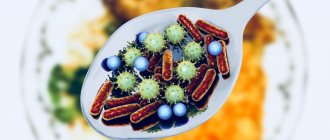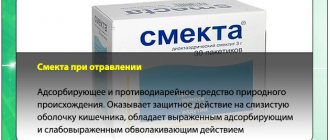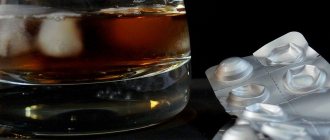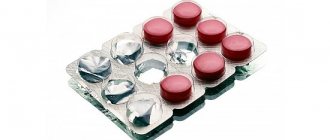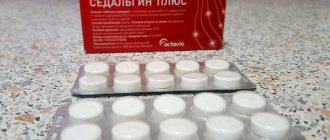We are talking about diarrhea, nausea, vomiting, and discomfort in the abdominal area. But very often dizziness during poisoning is added to the above. Some patients are surprised by this turn of events. So is vertigo considered normal during intoxication, or is it the first sign of a severe form of the disease?
Types of poisoning
Based on the nature of clinical manifestations, they are divided into:
- Acute (occur when the poison is administered once in a toxic dose) They are characterized by rapid development and severity of symptoms.
- Chronic (develops with long-term, gradual and constant intake of poison in a subtoxic dose)
In addition to the first two, sometimes a separate group of subacute toxicoses is distinguished, which occur when a pathogen is simultaneously ingested, the damaging effect of which is delayed.
In the clinical picture of an acute disease, it is customary to distinguish three stages.
- Toxigenic (aka early), the essence of which is the specific effect of a toxic agent on the body, leading to disruption of cell membranes, and subsequently distortion of interactions between receptors and enzymes.
- The somatogenic stage, which involves the activation of adaptive mechanisms aimed at combating disturbances in the normal functioning of internal organs.
- Delayed or late stage - residual damage to organs and tissues that occurs after the poison has been removed and its effects have ceased.
Treatment
If the patient’s intoxication goes away without diarrhea and vomiting, this means it is mild in nature and serious treatment will not be required.
In case of poisoning with alcohol, mushrooms, carbon monoxide or food, general recommended procedures for relieving and eliminating dizziness are:
- Long rest and sleep.
- Enema or gastric lavage.
- Use of laxatives.
- Taking sorbents and analgesics.
- Drinking enough.
- Taking a contrast shower.
- Rich breakfast.
Toxins cause significant harm to internal organs, and if the body is not able to get rid of them on its own, various cleansing techniques are used. After which the body begins to actively restore itself.
As a rule, the basis of the rehabilitation process is a special diet, designed in such a way as not to irritate the inflamed gastric mucosa.
Only a doctor - gastroenterologist or nutritionist has the right to develop a diet, because Trying to find options on your own can only make the situation worse.
The most commonly prescribed medications for poisoning are:
- Non-steroidal anti-inflammatory drugs – “Mig”, “Paracetamol”, “Indomethacin”.
- Adsorbent preparations – “Smecta”, “Polifepan”.
- Antispasmodics – “No-shpa”, “Platifillin”, “Papaverine”.
- Antibiotics (in case of spread of infection) - Ciprofloxacin, Rifaximin, Nifuroxazide.
- Enzymes – “Mezim”, “Festal”.
- Saline and colloidal solutions - “Stabizol”, “Gelofusin”, “Regidron”.
- Antacids, proton pump inhibitors to protect the gastrointestinal tract - Phosphalugel, Pantoprazole.
- Antiemetic drugs - Cerucal, Domrid.
- Vitamins to support cells of the nervous system - “Supradin”, “Berocca Plus”, “Pentovit”.
In addition, it is important to remember that doctors strictly prohibit drinking coffee, taking a hot bath, and relieving headaches with the help of citramon in case of poisoning. This may worsen symptoms.
When does dizziness occur?
Most often, this symptom occurs during the first two stages, as a by-product of adaptive reactions, however, in some cases, it persists during the later stage as a manifestation of damage to the nervous tissue.
The development and increase in symptoms usually develop quite quickly, with a sharp progression of clinical manifestations and the degree of organ dysfunction. However, sometimes it is slow, accompanied by a long-term increase in a number of specific symptoms. This is determined by the type of toxin and how much of the pathogen enters the blood. The specificity of the harmful effects of a considerable number of toxic agents ensures the predominance in the clinic of toxicosis of signs of damage to certain systems - the nervous, digestive tract, cardiovascular and others.
Prevention
To avoid the development of severe intoxication of the body and, as a result, hospitalization, you just need to follow a number of basic rules:
- Carry out thorough heat treatment of products at home, regardless of what certificates and certificates the trade worker has.
- Observe all rules of personal hygiene.
- Monitor the conditions in which the products are stored and the path they take from the manufacturer to the seller.
- Both the consumer and the retailer must carefully monitor the expiration dates of the product and its quality.
- Eat at home or in establishments whose quality of products is beyond doubt.
- Do not abuse alcohol (everything should be in moderation).
- If the product's shelf life has expired or its condition and quality are in doubt, it must be disposed of.
- When working with chemicals, toxins and other harmful substances, you should undergo regular medical examinations.
- Timely disposal of garbage will not only relieve residents of the stench in the room, it can cause fungi or mold accumulation.
- Perishable products must be consumed immediately after opening the package.
- Canned food is stored open only in accordance with the recommended periods.
- Before using any medication, you must carefully read the instructions for use and follow the instructions.
- Do not stay in smoky rooms unless necessary, and periodically check the condition of the gas equipment in the house.
And the main advice: if you start to feel dizzy after poisoning, do not self-medicate, this can lead to a worsening of symptoms. The best solution would be to visit a doctor yourself or call a team to your home so that the cause of dizziness can be accurately determined.
Why do you feel dizzy when intoxicated?
Regardless of the type of lesion, the mechanism for the development of clinical manifestations is similar in its main points. When toxins enter the bloodstream, the immune system responds by including defense mechanisms to remove pathogens. The so-called intoxication syndrome develops.
The body’s protective reaction is expressed by such phenomena as vomiting against a background of nausea and increased sweating, which contribute to the rapid removal of poisons.
However, along with the poisons, a lot of liquid is also removed, and at the same time electrolytes - mineral substances necessary for the normal functioning of internal systems. This is expressed by the appearance of lightheadedness, accompanied by lethargy, adynamism, and general malaise.
There are other reasons for the development of vertigo when consuming poisons. It can be provoked by venous congestion in the liver or gall bladder, which occurs against the background of intoxication, as well as malfunctions of these organs due to direct damage to tissue cells by certain poisons. Because of this, the synthesis of hemoglobin, which carries oxygen to the tissues, is disrupted. As a result, blood oxygen saturation decreases - hypoxia occurs.
Brain hypoxia causes depression of the nervous system, in particular the vestibular apparatus, resulting in dizziness.
This is accompanied by headache, decreased mood, and a feeling of general malaise. In addition, the head is dizzy due to the direct effect of the poison on the nervous tissue, causing degeneration of nerve cells, leading to inhibition of the functioning of this system. This is especially typical for the improper use of medications, intoxication with low-quality alcohol, damage from heavy metals, gases, and combustion products.
Causes
Doctors have identified a number of factors that explain dizziness during poisoning:
- The spread of toxic substances throughout the body, due to which intoxication begins. The protective function of the immune system is activated and discomfort appears, manifested by nausea, vomiting and dizziness.
- Intoxication of the body provokes the beginning of the removal of harmful substances from the body; along with fecal and vomit, useful substances are also released in combination with water. Symptoms appear: deterioration in the general condition of the body, weakness and body aches, apathy, and dizziness.
- A similar condition is caused by a decrease in hemoglobin content or blood retention in the liver.
- The reasons why a person feels dizzy are disturbances in the functioning of the gastrointestinal tract or pancreas.
- If dizziness began from food poisoning or due to alcohol intoxication, it means that the body’s defense systems are trying to prevent toxins from entering the brain.
What accompanies
Dizziness caused by intoxication does not have any distinctive features characteristic of specific coordination disorders in neurological pathologies or brain tumors. This manifestation usually develops after the onset of vomiting and diarrhea, is systemic in nature and often intensifies when changing body position (for example, when moving from a horizontal to a vertical position when getting out of bed). In addition, it is usually accompanied by signs of dehydration (dry mouth, thirst, weakness, and sometimes depression of consciousness), headache, and a feeling of chills.
The strength and severity of accompanying symptoms depends on the type of pathogen and is more pronounced in the case of poisoning with drugs, alcohol, and also with some foodborne toxic infections.
For example, in the clinical picture of acute alcoholic injury, coordination disorder is accompanied by other neurological manifestations, for example, a symmetrical change in the size of the pupils, distortion of the sweat and salivary glands, causing sweating and increased salivation, changes in thermoregulation, manifested by chills.
Symptoms and signs
The feeling that occurs when dizziness begins cannot be confused with anything: difficulty breathing, weakness, nausea. Due to changes in blood pressure, pain can migrate from the parietal region of the head to the temporal or frontal region. If the pressure increases, the pain is more pronounced in the back of the head. Certain medications taken to treat the disease increase dizziness.
Actually, a lack of coordination occurs at any stage of poisoning and changes in intensity depending on the state of health and concomitant diseases.
Associated symptoms
If poisoning is accompanied by impaired coordination, it is advisable for the patient to monitor the state of the body. Do not forget that against the background of intoxication, symptoms appear:
- Increased body temperature.
- Gastrointestinal disorders such as diarrhea or constipation.
- Nausea ending in vomiting.
- A state of weakness in the body.
- Decreased ability to work.
- Poor appetite or its complete absence.
- Flickering of flies before the eyes, blurry image.
- Arrhythmia.
- Blood pressure surges.
- Convulsions and paralysis of body parts.
- Increased sweating and salivation.
- Dry throat, severe thirst.
What to do if you feel dizzy
First actions
Firstly, in case of severe coordination disorder, it is necessary to take a safe position. When dizzy, the sensation of movement may occur suddenly and the person may become disoriented, leading to loss of balance and falling and injury.
In this case, it is recommended to transfer the patient to a supine position, and the head and shoulders should be at the same level. This position helps restore normal blood supply to the head.
The next action should be to seek medical help, because serious suffering of the body cannot be ruled out.
Coping with intoxication
While waiting for the doctor to arrive, the patient can already be given first aid.
If severe vomiting and diarrhea occur, fluids and electrolytes must be replaced. In this situation, it is not enough to simply drink a lot of ordinary water, since the lack of salts contained in the blood plasma is also an important pathogenetic factor in the development of intoxication syndrome. To replenish the electrolyte composition of the blood, saline solutions such as Regidron are used, usually sold in any pharmacy. You can also make a saline solution yourself by adding sugar (1 tablespoon per liter), kitchen salt (1 teaspoon per liter), and soda (0.5 teaspoon per liter) to boiled water.
In addition to combating dehydration, the use of sorbents is indicated - substances that bind harmful substances and help remove toxins from the body. These include the familiar activated carbon or drugs such as Polysorb, Enterosgel, also sold in any pharmacy.
Waiting for the doctor
In addition, the patient needs to warm his extremities, unfasten his clothes and provide a flow of fresh air (especially important in acute carbon monoxide poisoning) and provide bed rest while awaiting the arrival of the doctor.
If there is tremor or convulsions, it is necessary to immobilize the patient to protect him from involuntary self-injury.
In extreme heat, you can wash the victim with cool water.
In cases where the clinical manifestations are caused by the direct effect of the pathogen on the cells of the nervous tissue, the patient needs urgent specialized care in a hospital setting.
If it doesn't work
Usually, along with other phenomena, vertigo soon goes away. If, after relief, this sensation persists for a long time while other symptoms disappear, it is possible that we are talking about damage to the vestibular apparatus. In this case, this problem often turns out to be much more pronounced, and can also acquire a specific character (deviation to one side, occurrence only in a certain position, flashing “spots” before the eyes, loss of consciousness, distortion of auditory and visual perception, loss of sensitivity in some areas body, limbs, speech disorders, etc.). The presence of such changes requires careful differential diagnosis followed by treatment in a hospital setting.
First aid
The first aid method depends on the type of poisoning (but the first thing to do is call an ambulance):
- In case of food or drug poisoning, the stomach is washed, then the patient is given an absorbent (Polysorb, Enterosgel or activated carbon).
- If the causes are carbon monoxide or volatile chemicals, the patient is immediately taken out of the room into fresh air, and the body temperature is lowered with a wet cloth or napkin.
Further actions before the doctors arrive are usually the same for all cases:
- Provide the person with plenty of fluids.
- Transfer to a horizontal position; if the patient feels nauseous or has the urge to vomit, turn over on its side.
- Provide sufficient oxygen (open doors and windows, remove clothing that interferes with breathing).
Tell the ambulance team in detail what symptoms are troubling the patient, how long ago they appeared and what was done to eliminate them before the doctors arrive.
Vertigo as a symptom of chronic toxicosis
However, sometimes persistent mild lightheadedness is a sign of ongoing harmful effects. Chronic poisoning, as mentioned earlier, develops with a long-term constant or intermittent intake of toxic agents into the blood in subtoxic doses. In this case, the clinical stage of the acute stage does not develop. But with the accumulation of a large amount of a toxic pathogen in the body, nonspecific complaints develop, namely: weakness, drowsiness, memory and coordination disorders, mental changes.
Preventive measures
In order to reduce the risk of food poisoning, you should follow a few simple recommendations that are easy to follow in everyday life:
- practice hand hygiene before eating;
- keep the area in which food is stored and consumed clean;
- use products from trusted manufacturers;
- Foods and products that are subject to rapid spoilage should be stored in the refrigerator for no longer than the recommended period.;
- Canned food and other factory-packaged products should be consumed immediately after opening or within the near future;
- isolate food waste and regularly disinfect waste containers;
- apply measures for thermal and hygienic processing of all products.
Who has it?
For example, working in a chemical plant and having daily contact with toxic metal fumes and combustion products, a person may notice similar symptoms. Workers in factories producing varnishes, chemical dyes, insecticides and other things are at risk.
Nicotine intoxication from smoking can also cause a constant feeling of unsteadiness and uncertainty in movements. In such cases, it is the result of constant exposure of the nervous system to the toxin.
With certain medications, unsteadiness of gait and illusion of rotation are side effects.
Dizziness with different types of poisoning
Dizziness is diagnosed in many types of intoxication. A similar protective reaction is present until the toxic substance is completely removed.
Poisoning:
- Toxic substances, gases in industry,
- Alcoholic drinks,
- Tobacco and tobacco smoke,
- Medicines,
- Carbon monoxide.
The presence of the described factors leads to the development of poisoning and dizziness in adults and children. In some situations, dizziness becomes the first sign of intoxication.
Differential diagnosis: what is important to tell the doctor
If there are complaints of constant lightheadedness and suspicion of chronic toxicosis, differential diagnosis is carried out to exclude other pathological conditions accompanied by the same symptoms. At the same time, the mechanism of development of vertigo differs from that under the influence of toxins, and therefore, the treatment tactics will be different. The list of these diseases includes:
- Poor nutrition.
- Decreased hemoglobin levels due to hematological diseases.
- Diseases of the nervous system.
- Osteochondrosis of the cervical spine.
- Diseases of the cardiovascular system.
- Traumatic brain injury.
- Mental disorders.
The most important thing for differential diagnosis for similar complaints is anamnesis. Contact with industrial substances, agricultural poisons, living in a polluted area, as well as the absence of chronic diseases, young age - all this points to chronic intoxication as the most likely cause of vestibular function disorder.
Associated symptoms of dizziness
If you feel dizzy after poisoning, you should monitor your condition and note the presence or absence of the following accompanying symptoms:
- increased body temperature;
- frequent loose stools;
- nausea and vomiting;
- loss of appetite;
- blurred vision, expressed by blurred images;
- headaches of various localizations, noises in the head;
- disorders of the central nervous system, for example, numbness or paralysis of the limbs.
The last two signs indicate very severe food poisoning or infection with infections such as botulism or listeriosis . Their danger lies in the risk of infection spreading to vital organs, which may result in disability or even death of the patient. If such symptoms are present, it is recommended to immediately take measures to neutralize the toxic substance, and also call an ambulance.
Don't miss the disease
Often, vertigo is not a dangerous symptom and is explained by ordinary fatigue, lack of sleep, climate change or lack of glucose, which is easily replenished with a regular snack.
However, also, taking into account all of the above, it becomes clear that it is often the first sign of acute or chronic toxicosis and other serious diseases. Therefore, any pronounced or long-lasting feeling of rotation of surrounding objects is a reason to consult a doctor and undergo a thorough examination.
Indications for visiting a doctor
The main reason for seeking help for diarrhea is the risk of dehydration and increased intoxication. Contact your doctor if you have the following symptoms:
- dry lips and mucous membranes of the mouth;
- constant thirst;
- confusion;
- rare urination;
- general weakness;
- lowering blood pressure.
The presence of severe pain in the abdominal cavity, accompanied by intoxication, is a dangerous symptom that requires medical intervention.

